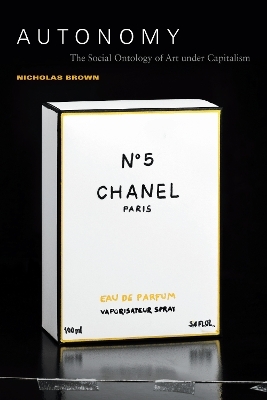
Autonomy
The Social Ontology of Art under Capitalism
Seiten
2019
Duke University Press (Verlag)
978-1-4780-0124-9 (ISBN)
Duke University Press (Verlag)
978-1-4780-0124-9 (ISBN)
Nicholas Brown theorizes the historical and theoretical conditions for the persistence of art's autonomy from the realm of the commodity by showing how an artist's commitment to form and by demanding interpretive attention elude the logic of capital.
In Autonomy Nicholas Brown theorizes the historical and theoretical argument for art's autonomy from its acknowledged character as a commodity. Refusing the position that the distinction between art and the commodity has collapsed, Brown demonstrates how art can, in confronting its material determinations, suspend the logic of capital by demanding interpretive attention. He applies his readings of Marx, Hegel, Adorno, and Jameson to a range of literature, photography, music, television, and sculpture, from Cindy Sherman's photography and the novels of Ben Lerner and Jennifer Egan to The Wire and the music of the White Stripes. He demonstrates that through their attention and commitment to form, such artists turn aside the determination posed by the demand of the market, thereby defeating the foreclosure of meaning entailed in commodification. In so doing, he offers a new theory of art that prompts a rethinking of the relationship between art, critical theory, and capitalism.
In Autonomy Nicholas Brown theorizes the historical and theoretical argument for art's autonomy from its acknowledged character as a commodity. Refusing the position that the distinction between art and the commodity has collapsed, Brown demonstrates how art can, in confronting its material determinations, suspend the logic of capital by demanding interpretive attention. He applies his readings of Marx, Hegel, Adorno, and Jameson to a range of literature, photography, music, television, and sculpture, from Cindy Sherman's photography and the novels of Ben Lerner and Jennifer Egan to The Wire and the music of the White Stripes. He demonstrates that through their attention and commitment to form, such artists turn aside the determination posed by the demand of the market, thereby defeating the foreclosure of meaning entailed in commodification. In so doing, he offers a new theory of art that prompts a rethinking of the relationship between art, critical theory, and capitalism.
Nicholas Brown is Associate Professor of English and African American Studies at the University of Illinois at Chicago, author of Utopian Generations: The Political Horizon of Twentieth-Century Literature, and coeditor of Contemporary Marxist Theory: A Reader.
Acknowledgments ix
Introduction. On Art and the Commodity Form 1
1. Photography as Film and Film as Photography 41
2. The Novel and the Ruse of the Work 79
3. Citation and Affect in Music 115
4. Modernism on TV 152
Epilogue. Taking Sides 178
Notes 183
Bibliography 207
Index 215
| Erscheinungsdatum | 28.02.2019 |
|---|---|
| Zusatzinfo | 30 illustrations, incl. 21 in color |
| Verlagsort | North Carolina |
| Sprache | englisch |
| Maße | 152 x 229 mm |
| Gewicht | 499 g |
| Themenwelt | Kunst / Musik / Theater ► Antiquitäten |
| Geisteswissenschaften ► Philosophie | |
| Geisteswissenschaften ► Sprach- / Literaturwissenschaft ► Anglistik / Amerikanistik | |
| Geisteswissenschaften ► Sprach- / Literaturwissenschaft ► Literaturwissenschaft | |
| ISBN-10 | 1-4780-0124-0 / 1478001240 |
| ISBN-13 | 978-1-4780-0124-9 / 9781478001249 |
| Zustand | Neuware |
| Haben Sie eine Frage zum Produkt? |
Mehr entdecken
aus dem Bereich
aus dem Bereich
Poetik eines sozialen Urteils
Buch | Hardcover (2023)
De Gruyter (Verlag)
59,95 €
Entzauberung und Faszination des Immergleichen in Literatur und Film
Buch | Softcover (2024)
Springer Fachmedien Wiesbaden GmbH (Verlag)
84,99 €
Buch | Softcover (2024)
belleville (Verlag)
20,00 €


